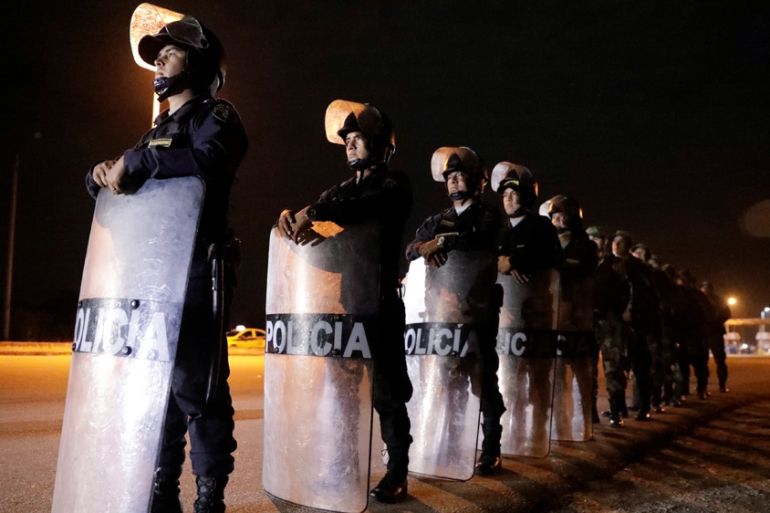Venezuelans rush to enter Peru before new rules imposed
Thousands of migrants cross into Peru ahead of the deadline for all Venezuelans to have valid visas and passports.

Thousands of Venezuelans have rushed to Peru‘s northern border on Friday in hopes of entering the Andean country before the introduction of tough immigration requirements at midnight.
Venezuela’s economic collapse under President Nicolas Maduro has unleashed the biggest migratory crisis in recent Latin American history, forcing countries like Peru – a developing nation of 32 million people – to grapple with an unprecedented surge in immigration.
Keep reading
list of 4 itemsPalestinian Prisoner’s Day: How many are still in Israeli detention?
‘Mama we’re dying’: Only able to hear her kids in Gaza in their final days
Europe pledges to boost aid to Sudan on unwelcome war anniversary
There were many children in the crowds of tired migrants who arrived at the Peruvian border town of Tumbes from Ecuador on Friday, before the June 15 deadline for all Venezuelan migrants to have valid visas and passports to enter Peru.
On Thursday alone, 5,849 Venezuelans entered Peru at Tumbes, compared with a daily average of around 1,500-2,000 in recent months, Peru’s immigration office said on Friday.
“It was awful!” said Rosmaura, a 25-year-old Venezuelan migrant who said she had travelled for a week from the eastern Venezuelan city of Maracaibo to reach Tumbes with her two children.
Rosmaura was afraid that after the deadline Peru would not let her 5-year-old daughter in because she lacks a passport, which she said costs $200-$500 in Venezuela – an impossible fee for most people in a country where the monthly minimum wage equates to just $6.
She said she hopes to make it to Chile.
“Most of my family is there,” she said.
Peru’s new policies
Previously, Venezuelan citizens only needed a national ID card to enter Peru.
Four million Venezuelans – more than a tenth of the population – have fled the economic and humanitarian crisis in their homeland, the United Nations said last week.
Peru’s government says it is home to some 800,000 – the second-largest Venezuelan migrant population outside Colombia, which houses more than 1.2 million.
Just two years ago, Peru had introduced new migratory laws to accommodate Venezuelan migrants. It doled out hundreds of thousands of special residency cards so they could work legally, go to school and access public healthcare.
But the tide has since turned, amid growing fears fanned by media reports and politicians that Venezuelan migrants are driving down wages and increasing crime.
The government has said it would require migrants to secure a visa from its consulates in Venezuela before going to the border – a policy similar to one implemented by neighbouring Chile.
As migrants took buses, hitchhiked and trekked their way to Peru’s border on Thursday, President Martin Vizcarra defended his new immigration stance from an event in the northern city of Piura.
“Our country has opened its arms to more than 800,000 Venezuelans. I think it’s completely logical and justified to ask them to bring visas to ensure better control of who enters,” Vizcarra told journalists.
In the middle of this crisis Michelle Bachelet, UN high commissioner for human rights, said she will visit Venezuela this month, where she will meet both President Maduro and opposition leader Juan Guaido.